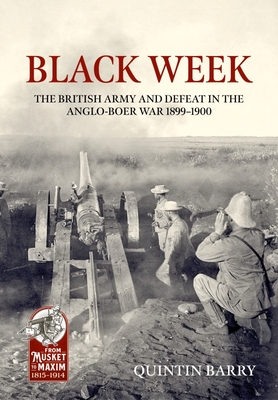Black Week: The British Army and Defeat in the Anglo-Boer War 1899-1900

Black Week: The British Army and Defeat in the Anglo-Boer War 1899-1900
In 1899 few readers of Rudyard Kipling's poem 'The Absent Minded Beggar, ' in which he wrote of 'Fifty thousand horse and foot going to Table Bay, ' could have supposed that this army faced any serious risk of defeat from a handful of Boer farmers. Britain was going to war with the Boer Republics in order to assert her supremacy over southern Africa, and had mobilized a complete army corps, under General Sir Redvers Buller. This was a force considered to be more than ample to bring victory very quickly.
Yet before the end of that year, in the space of one week, the British Army had suffered three defeats, at Stormberg, Magersfontein and Colenso. For the British Press and public the shock was enormous. The battle of: Colenso in particular destroyed many illusions about the effectiveness of the British Army, and so far as the government was concerned, confidence in Buller's leadership was shattered. As commander-in-chief in South Africa, it turned to Lord Roberts, and prepared to overcome the military setbacks by dispatching substantial reinforcements.
Before these decisions could take effect, however, the disastrous battle of Spion Kop had been fought, further exposing the failures in leadership The government, and the British military establishment now faced the task of recovering from these traumatic defeats, as well as discovering the reasons for them. It was not going to be easy. The Second Boer War did not end until 1902, by which time the British forces engaged against the Boer Republics had risen tenfold in number. Nor did 'Black Week, ' as those few days in 1899 came to be known, mark the end of military setbacks in South Africa. A lot of painful lessons had still to be learned about combat with an enemy armed with the most modern weapons before the Boers were finally defeated. These lessons would be learned not only on the battlefield but also around the tables of the numerous committees established to determine the reason why things had gone so wrong.
PRP: 215.64 Lei
Acesta este Prețul Recomandat de Producător. Prețul de vânzare al produsului este afișat mai jos.
194.08Lei
194.08Lei
215.64 LeiLivrare in 2-4 saptamani
Descrierea produsului
In 1899 few readers of Rudyard Kipling's poem 'The Absent Minded Beggar, ' in which he wrote of 'Fifty thousand horse and foot going to Table Bay, ' could have supposed that this army faced any serious risk of defeat from a handful of Boer farmers. Britain was going to war with the Boer Republics in order to assert her supremacy over southern Africa, and had mobilized a complete army corps, under General Sir Redvers Buller. This was a force considered to be more than ample to bring victory very quickly.
Yet before the end of that year, in the space of one week, the British Army had suffered three defeats, at Stormberg, Magersfontein and Colenso. For the British Press and public the shock was enormous. The battle of: Colenso in particular destroyed many illusions about the effectiveness of the British Army, and so far as the government was concerned, confidence in Buller's leadership was shattered. As commander-in-chief in South Africa, it turned to Lord Roberts, and prepared to overcome the military setbacks by dispatching substantial reinforcements.
Before these decisions could take effect, however, the disastrous battle of Spion Kop had been fought, further exposing the failures in leadership The government, and the British military establishment now faced the task of recovering from these traumatic defeats, as well as discovering the reasons for them. It was not going to be easy. The Second Boer War did not end until 1902, by which time the British forces engaged against the Boer Republics had risen tenfold in number. Nor did 'Black Week, ' as those few days in 1899 came to be known, mark the end of military setbacks in South Africa. A lot of painful lessons had still to be learned about combat with an enemy armed with the most modern weapons before the Boers were finally defeated. These lessons would be learned not only on the battlefield but also around the tables of the numerous committees established to determine the reason why things had gone so wrong.
Detaliile produsului










